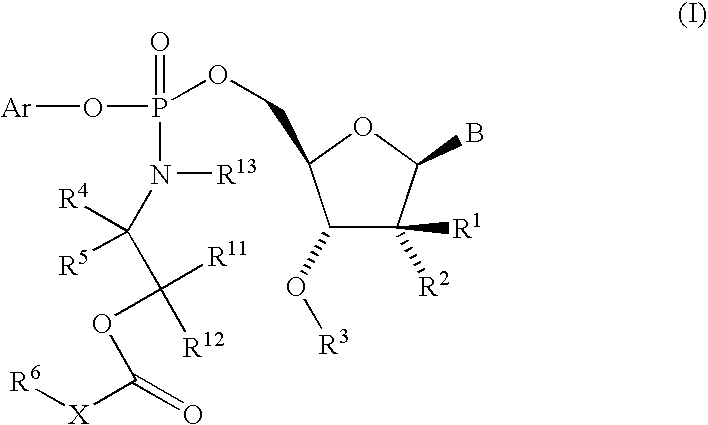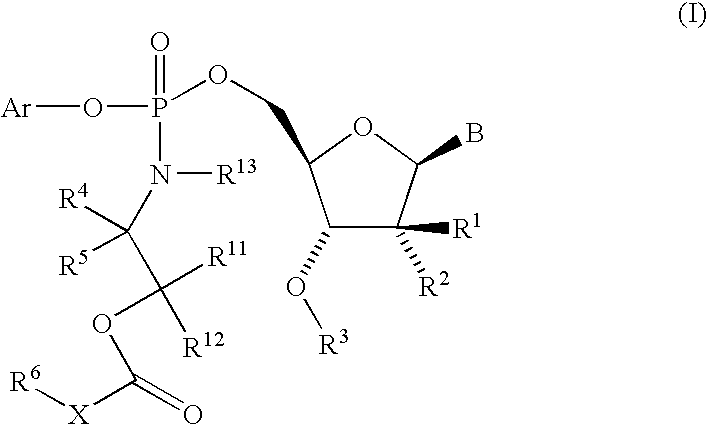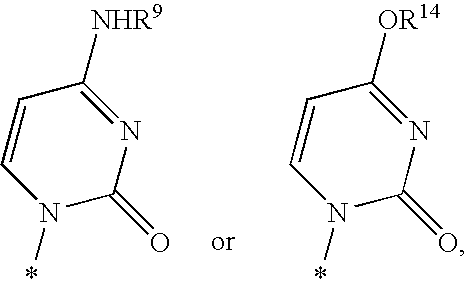Nucleoside aryl phosphoramidates for the treatment of RNA-dependent RNA viral infection
a technology of rna-dependent rna and phosphoramidates, which is applied in the field of nucleoside aryl phosphoramidates, can solve the problems of limited clinical benefit, no established vaccine for hcv, and treatment of hcv infection, and achieves less susceptible, wide therapeutic index, and efficient target cell penetration
- Summary
- Abstract
- Description
- Claims
- Application Information
AI Technical Summary
Benefits of technology
Problems solved by technology
Method used
Image
Examples
example 1
5′-O-[({(1S)-2-[(2,2-Dimethylpropanoyl)-oxy]-1-methylethyl}-amino)-(phenoxy)-phosphoryl]-2′-C-methylcytidine
Step 1: (2S)-2-[(tert-butoxycarbonyl)-amino]-propyl pivalate
[0143]
[0144]To a solution of the commercially available tert-butyl [(1S)-2-hydroxy-1-methylethyl]carbamate (1.0 eq.) in DCM (0.19M), pivaloyl chloride (1.1 eq.) and Et3N (1.1 eq.) were added. The reaction mixture was stirred at RT for 48 h, then water was added and the organic phase was separated and washed with 10% aqueous citric acid. The residue was purified by column chromatography on silica gel eluting with 92:8 PE / EtOAc.
[0145]1H NMR (300 MHz, CDCl3) δ 4.82 (br s, 1H), 4.39-4.25 (m, 3H), 1.75 (s, 9H), 1.55-1.45 (m, 12H)
Step 2: (2S)-2-aminopropyl-2,2-dimethylpropanoate hydrochloride
[0146]
[0147]To a solution of (2S)-2-[(tert-butoxycarbonyl)-amino]-propyl pivaloate (1.0 eq.) in EtOAc (0.6 M) was added 4N HCl in dioxane (10 eq.). The reaction mixture was stirred for 2.5 h and then the solvent was evaporated in vacuo ...
example 2
5′-O-[{[(±)-2-(Butyryloxy)-1-methylethyl]-amino}-(phenoxy)-phosphoryl]-2′-C-methylcytidine
Step 1: (2S)-2-{[chloro(1-phenoxy)phosphoryl]amino}propyl butyrate
[0155]
[0156]Following the procedure described for Example 1, step 3, treatment of a solution of phenyl dichlorophosphate in DCM (0.144 M) with (2S)-2-aminopropyl butyrate hydrochloride (1.0 eq.), (prepared following the same procedure described for Example 1, step 1 and 2) and Et3N (2.0 eq.) provided the title compound as a colorless oil as a 1:1 mixture of diastereoisomers. 31P NMR (300 MHz, CDCl3) δ: 10.12 and 9.94.
Step 2: 5′-O-[{[(1S)-2-(butyryloxy)-1-methylethyl]-amino}-(phenoxy)-phosphoryl]-2′-C-methylcytidine
[0157]
[0158]Following the procedure described for Example 1, step 4,2′-C-methylcytidine in THF (0.097 M) was cooled to −78° C., then tert-butylmagnesium chloride (as 1.0 M solution in THF, 2.2 eq.) was added, followed by the addition of (2S)-2-[[chloro(1-phenoxy)phosphoryl]amino]propyl butyrate (as a 1.0 M solution in T...
example 3
5′-O-[[[2-(2,2-Dimethyl-1-oxopropoxy)-ethyl]-amino]-(phenoxy)-phosphinyl]-2′-C-methylcytidine
Step 1: 2′-C-methyl-2′,3′-O-(1-methylethylidene)-cytidine
[0162]
[0163]2′-C-Methylcytidine was diluted with acetone (0.04M) and p-toluensulfonic acid and 2,2-dimethoxypropane were added. The resulting slurry was stirred for 24 h at RT. The solvent was evaporated, the residue was dissolved in MeOH and Amberlite A-26 (previously washed with 2N NaOH and H2O) was added. The resulting mixture was stirred for 2 h. The Amberlite was filtered off and the solution was evaporated. The crude product was purified by column chromatography on silica gel (DCM / MeOH=9:1) to give the desired product as a white powder.
[0164]1H NMR (300 MHz, CD3OD) δ 7.96 (d, J=7.56 Hz, 1H), 6.18 (s, 1H), 5.90 (d, J=7.56 Hz, 1H), 4.51-4.48 (m, 1H), 4.28-4.23 (m, 1H), 3.86 (dd, J=3.04 and 12.12 Hz, 1H), 3.78 (dd, J=3.52 and 12.12 Hz, 1H), 1.59 (s, 3H), 1.43 (s, 3H), 1.25 (s, 3H); MS (ES+) m / z 298 (M+H)+
Step 2: 5′-O-[[[2-(2,2-dimet...
PUM
| Property | Measurement | Unit |
|---|---|---|
| frequencies | aaaaa | aaaaa |
| frequencies | aaaaa | aaaaa |
| flow rates | aaaaa | aaaaa |
Abstract
Description
Claims
Application Information
 Login to View More
Login to View More - R&D
- Intellectual Property
- Life Sciences
- Materials
- Tech Scout
- Unparalleled Data Quality
- Higher Quality Content
- 60% Fewer Hallucinations
Browse by: Latest US Patents, China's latest patents, Technical Efficacy Thesaurus, Application Domain, Technology Topic, Popular Technical Reports.
© 2025 PatSnap. All rights reserved.Legal|Privacy policy|Modern Slavery Act Transparency Statement|Sitemap|About US| Contact US: help@patsnap.com



